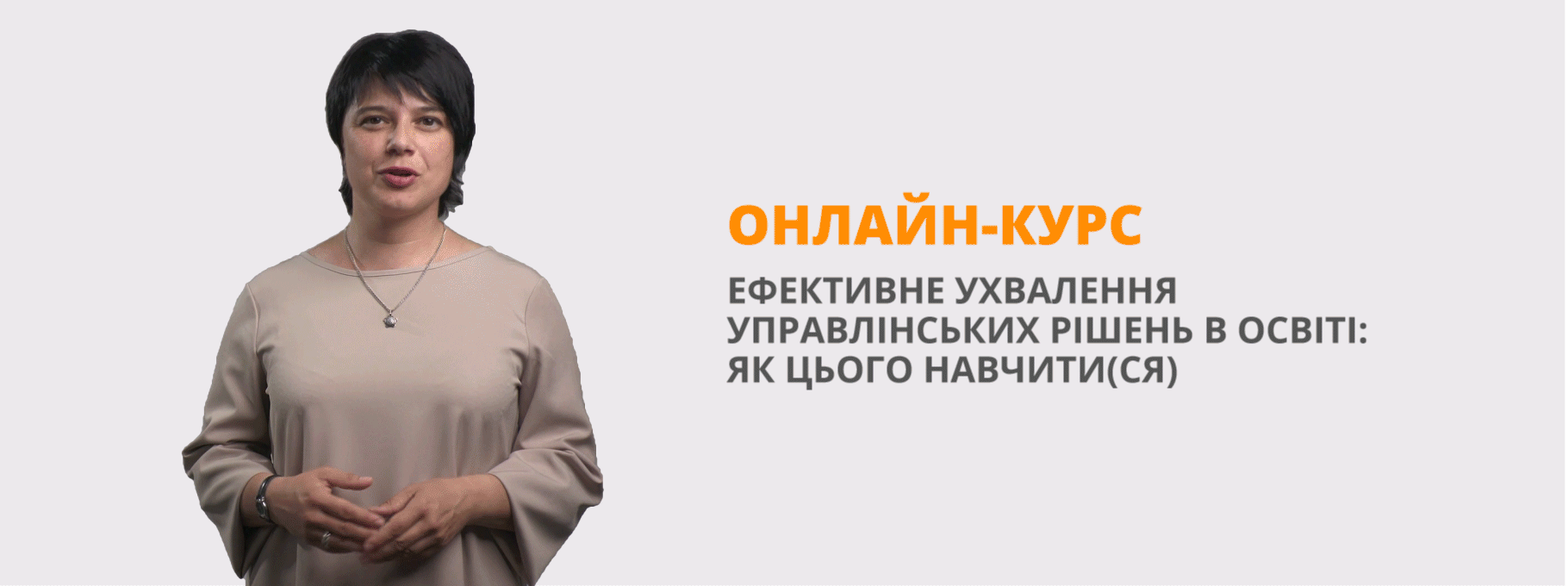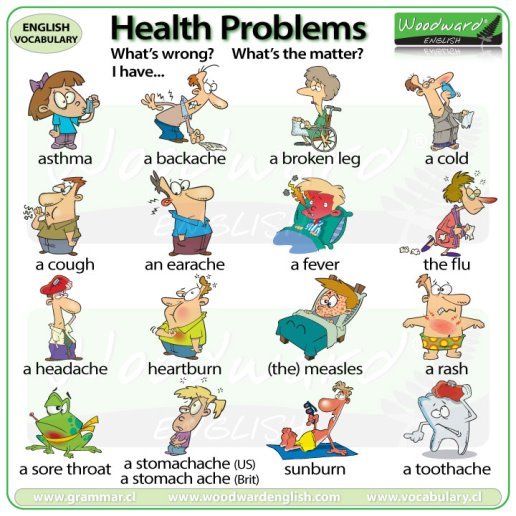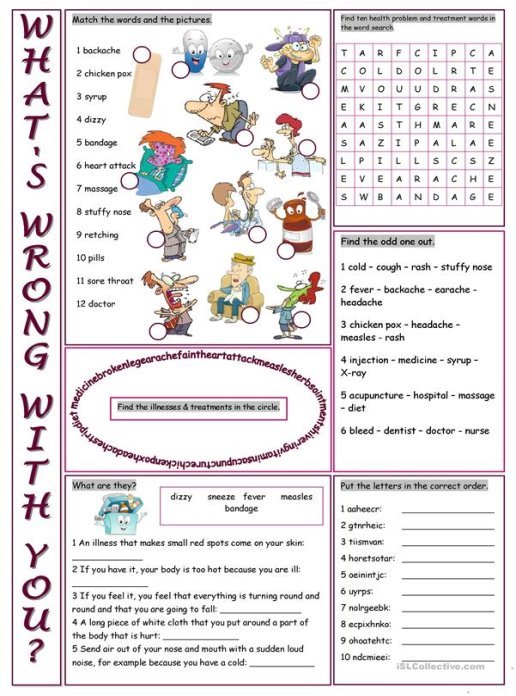Цикл уроків за темою "Health Highlights"
Даний цикл уроків з теми "Health Highlights" до підручника А. Несвіт включає в себе різноманітні традиційні та інноваційні форми і методи навчання. Сподіваюсь, що кожен вчитель у даній розробці знайде для себе щось нове та корисне!
Цикл уроків з англійської мови
«Health Highlights»
вчителя англійської мови,
заступника директора з НВР
Новомиколаївської ЗОШ І-ІІІ ст.
Андрієнкова Ігоря Леонідовича
Новомиколаївка – 2017
Unit 3
Health Highlights
Lesson 1
Topic: How do you feel?
Objects: to introduce new words, to activate them, to develop reading and speaking skills using lexical-grammatical structures, to develop linguistic guess, to develop the culture of healthy lifestyle.
Equipments: textbook, workbook, cards, hand-out materials
Type of the lesson: combined.
Procedure
I. Preparing for perception of the foreign language
1. Greeting
2. Aim
T: Today we are going to speak about our health and illnesses which may cause us a lot of troubles.
3. Warming up
At first let’s revise the parts of the body and the words which are connected with them. (You may use pictures or dolls.)
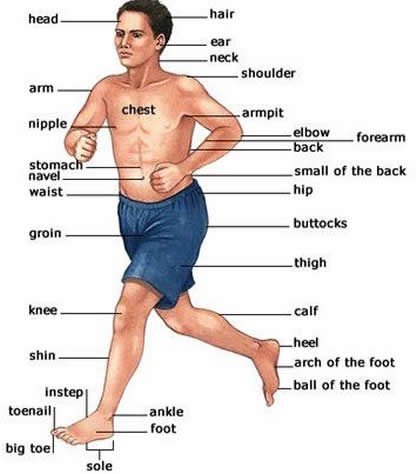
II. Main body
1. Presenting vocabulary. Reading and speaking
Complete the table.
|
What makes us healthy? |
What makes us unhealthy? |
|
|
|
3. Reading and writing
Ask your partner and complete the dialogue.
TELEPHONE CONVERSATION
— Is this 7764282?
— Yes, it is. Can I help you?
— Hi, Helen. It’s me,___________ .
— Oh hi, how are you?
— I’m not very well, you see.
— What’s wrong with you?
— I have got a _____________.
— Did you call a doctor?
— Yes, I did. The doctor came to me yesterday.
— What did the doctor say?
— She said I had caught a bad cold, so I have to stay_________ . Can you tell me the_________________ ?
— Sorry, Paul, I can’t. You see, I didn’t go to school, too.
— Are you all right, Helen?
— I’m all right now, but I felt bad__________ . I had toothache and my mum took me to the dentist ___________. So I had to miss the lessons.
— Well, I hope you are fine now?
— Yes, I’m well. Thank you.
4. Vocabulary practice
2) Look at the pictures and say how these people feel.




5. Speaking
6. Vocabulary practice
7. Reading and speaking
Key: 1 D, 2 A, 3 B, 4 C, 5 F, 6 G, 7 E.
III. Summarizing
1. Summary
T: Today we spoke about your health. When did you feel bad last time? What was wrong with you? What did you do to recover?
2. Homework
Ex. 5, p. 59.
Lesson 2
Topic: What’s the matter with you?
Objects: to introduce new words, to practice vocabulary, to develop reading and speaking skills using lexical-grammatical structures, to develop linguistic guess, to develop the culture of healthy lifestyle.
Equipments: textbook, workbook, cards, hand-out materials
Type of the lesson: combined.
I. Preparing for perception of the foreign language
1. Greeting
2. Aim
T: During our lesson today we are going to speak about different kinds of injuries and some ways of their treatment.
3. Warming up
Are these statements true or false?
1. You are always all right if you eat fast.
2. Dairy products are made from milk and not from meat.
3. When you suffer from indigestion you have a pain in your leg.
4. If you can’t concentrate properly on your homework you’re overtired.
5. If you eat little food you’re overweight.
6. All our food is healthy.
7. Fast food is very good for men.
8. Chemicals make our food unhealthy.
9. Fruit and vegetables help you to keep fit.
10. You should drink a lot of water during the day.
4. Check on homework
Ex. 5, p. 59.
II. Main body
1. Presenting vocabulary
Do ex. 1, p. 59.
2. Vocabulary practice
Using the pictures learn the names of health problems.
The students choose any picture (they are upside down) and answer one by one the teacher’s question “What’s the matter with you?”
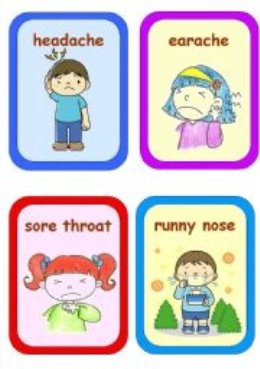
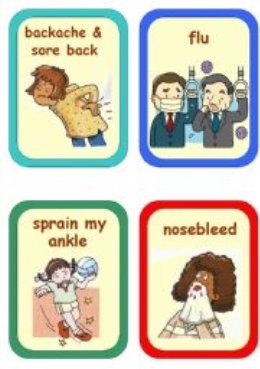
— What’s the matter?
— I’ve got a toothache.
— What are you going to do?
— I’m going to see a dentist.
3. Writing and speaking.
|
I He She |
have has
|
a headache. a splitting headache. a bad cough. a stomachache. a cold. a runny nose. a sore throat. a bad toothache. a pain in my knee / my elbow / my chest. a (high) temperature. |
4. Speaking
Work in pairs. Make up a dialogue.
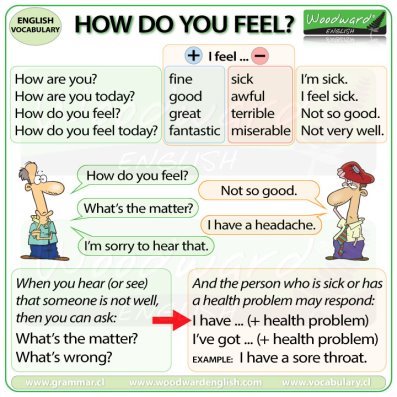
5. Speaking
6. Vocabulary practice
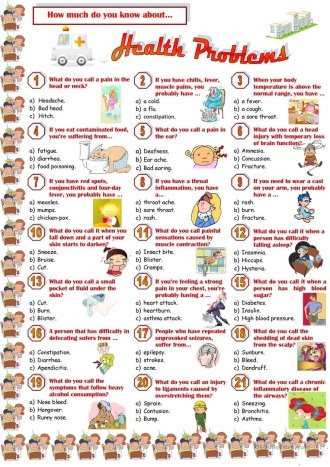
7. Speaking
8. Reading
III. Summarizing
1. Summary
2. Homework
Ex. 6, p. 61.
Lesson 3
Topic: Illnesses
Objects: to introduce new words, to practice vocabulary, to develop reading and speaking skills using lexical-grammatical structures, to develop linguistic guess, to develop the culture of healthy lifestyle.
Equipments: textbook, workbook, cards, hand-out materials
Type of the lesson: combined.
Procedure
I. Preparing for perception of the foreign language
1. Greeting
2. Aim
T: During our lesson today we are continuing to speak about different kinds of injuries and some ways of their treatment.
3. Warming up
Pupils go around the class asking questions then they sum up.
Have you ever…?
When did it happen last?
|
Name |
cold |
broken arm / leg |
flu |
terrible toothache |
|
Nazar |
|
|
|
|
|
Yevgen |
|
|
|
|
|
Olena |
|
|
|
|
|
Natalia |
|
|
|
|
Example: Olena caught a cold last year. She has never had a flu.
4. Check on homework
Ex. 6, p. 61.
Key: 1 had, 2 couldn’t eat, 3 couldn’t play, couldn’t sleep, 5 took, 6 pulled out, 7 cried, 8 said, 9 said.
ІІ. Main body
1. Vocabulary practice
2. Writing
Teacher shows pictures and pupils write down the words.
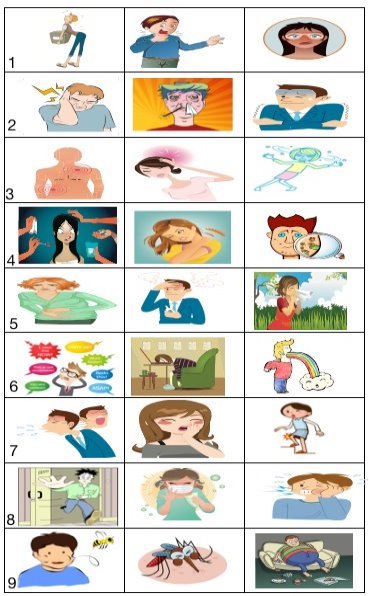
3. Speaking, reading and listening
1) Answer the questions. When was the last time you had a bad cold or flu? What were your symptoms?
2) Look at the symptoms below. Match the phrases with the symptoms. For example, I’ve got a headache.
Phrase beginnings Symptoms
I can’t stop a headache stomachache tired weak
I’ve got sneezing a sore throat ill
I feel a bad cough a high temperature
3) Derek is ill. Listen to the description of his symptoms. What is wrong with him?
I’ve got a terrible headache and a very high temperature. I feel tired and weak. I can’t eat anything and I have no energy. I feel hot all the time but I can’t stop shivering. I’ve got a runny nose and a sore throat. I don’t know what to do. I feel really awful.
Now imagine you are a doctor. Which of the following is good advice for Derek? Choose from the list below.
You should go to bed
You should take an aspirin
You should go jogging
You should take some medicine
You should go to hospital
You should drink water
You should go to work
You should eat soup
You should take vitamins
4. Reading
Give English equivalents to the following expressions:
Захворіти, блідий, головний біль, хворе горло, лихоманка / жар, залишатися в ліжку, викликати лікаря, оглянути пацієнта, серце та легені, застудитися , полоскати горло три рази на день, рецепт, слідувати порадам, поліпшитись, краще почуватися , лікування
5. Reading
6. Speaking
ІІІ. Summarizing
1. Summary
2. Homework
Ex. 6, p. 63.
Lesson 4
Objects: to introduce new words, to practice vocabulary, to develop listening and speaking skills, to develop cognitive interest, to develop independent thinking, to develop careful treatment of patients.
Equipments: textbook, workbook, cards, hand-out materials
Type of the lesson: combined.
Procedure
I. Preparing for perception of the foreign language
1. Greeting
2. Aim
T: We are continuing to learn more about our health and everything connected with it. Today we are going to speak about visits to the hospital.
3. Warming up
Remember the last time you were ill. Describe it.
1. When did it happen?
2. What was the matter?
3. How did you feel?
4. What caused your illness?
5. How quickly did you recover?
4. Check on homework
Ex. 6, p. 63.
II. Main body
1. Writing
2. Grammar practice
Match two parts of the questions .
They have been running for half an hour, haven’t they?
She wasn’t talking to the doctor, was she?
He always takes vitamins in winter, doesn’t he?
We have already seen him, haven’t we?
She never goes to work by bus, does she?
You are looking through the documents, aren’t you?
He didn’t find the money, did he?
We’ll arrive in an hour, won’t we?
3. Speaking
4. Listening
5. Speaking
Ask your partner and find out:
— if he/she has ever called an ambulance;
— why he/she called the ambulance;
— if this person was taken to in hospital;
— if your partner visited this person hospital;
— how your partner cheered the sick person up.
6. Vocabulary practice
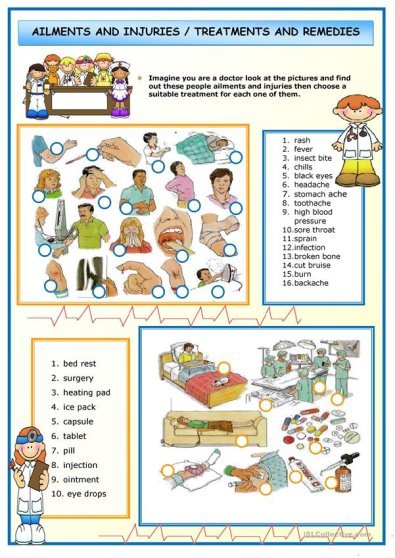
7. Listening
Listen to the dialogue.
Woman: So what can I do for you today?
Man: Well, I’ve been having1 really bad headaches, and sometimes I feel dizzy2.
Woman: How long have you been feeling like this?
Man: I think… About a week, maybe.
Woman: And did it start suddenly? Did anything happen which might have caused it?
Man: I don’t know. I’ve never felt like this before.
Woman: Ok, for today, I’ll give you a prescription3 for some painkillers4. Do you have any allergies5?
Man: No, not that I know of.
Woman: It’s just paracetamol. It’ll help you with the headaches. I’m also going to refer you to a specialist6 at the hospital. They’ll call you up to arrange an appointment.
Man: Do you think it’s something serious?
Woman: It could be a lot of things. If I were you I’d just get plenty of rest; don’t overexert7 yourself, and wait for the appointment with the specialist next week.
Man: Ok, thank you, doctor.
Woman: Don’t forget your prescription!
Man: Oh, yes, thanks.
Match the phrases to make sentences
|
1) I think I’ll have to refer… |
a) …some painkillers |
|
2) The doctor prescribed me… |
b) …really bad headaches recently |
|
3) I’ve been having… |
c) …make sure you don’t overexert yourself |
|
4) He’s allergic to… |
d) …you to a specialist |
|
5) Get plenty of rest and… |
e) …seafood, so cook something else |
Can you solve the anagrams?
Lothisap
pentompinat
zydiz
karnilplei
lyrelag
8. Reading and speaking
Role-play the situation:
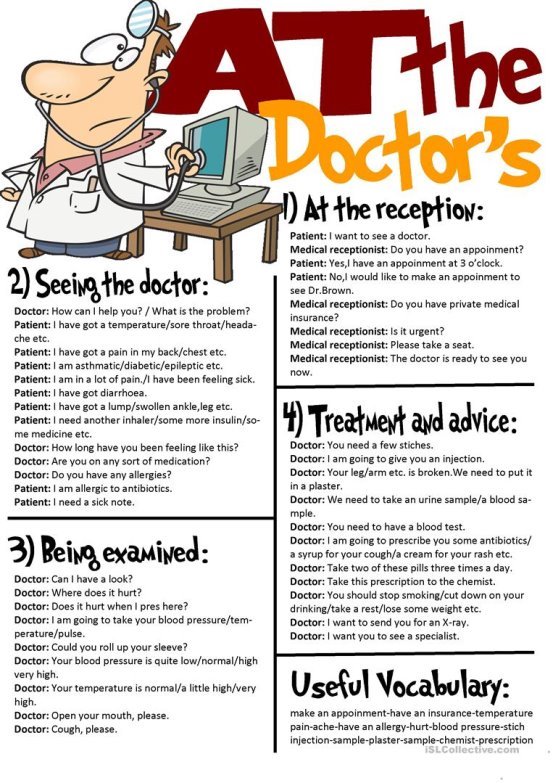
9. Speaking
III. Summarizing
1. Summary
Pretend you’ve fallen ill and complain in mini talks using the words you’ve learnt.
I feel awful. I’ve got a terrible headache.
I feel bad. I’ve got a terrible pain in my left side.
I can’t go out today. My leg hurts.
2. Homework
Ex. 6, p. 65.
Lesson 5
Topic: Healthy Well-Being?
Objects: to practice vocabulary, to develop reading and speaking skills using lexical-grammatical structures, to learn grammar lab: modal verbs – must, should, to develop linguistic guess, to develop the culture of healthy lifestyle.
Equipments: textbook, workbook, cards, hand-out materials
Type of the lesson: combined.
Procedure
I. Preparing for perception of the foreign language
1. Greeting
2. Aim
T: During our lesson today we’ll practice modal verbs and will discuss ways to stay healthy.
3. Warming up
1. When you have a sore throat you can go for a walk.
2. You should always stay in bed when you cough.
3. You will recover quicker if you stay in bed.
4. If the doctor prescribes a medicine for you, you shouldn’t take it regularly.
5. A person is healthy when he is free from illness.
6. You should eat the right food to keep fit.
4. Check on homework
Ex. 6, p. 65.
ІІ. Main body
1. Vocabulary practice
Write down the actions that doctors usually do.
Make sentences with these words about the last doctor’s visit.
2. Writing
Complete the sentences using as many words from the list as possible.
1. I feel … (ill, sick, dizzy, depressed).
2. You must have … (an operation, this medicine, some rest, a broken wrist, flu, a virus, an infection).
3. I’ve got … (a headache, a broken wrist, flu, a virus, a cold, an infection, a runny nose).
4. Be careful you don’t catch … (flu, a virus, a cold).
5. You need to see … (your doctor, a consultant).
6. I’m afraid it’s … (a broken wrist, flu, painful).
7. He’ll take … (this medicine, an aspirin, his tooth out, her to hospital).
8. You’ve sprained … (your ankle, your wrist).
9. She’s … (in great pain, dizzy).
10. It feels … (hot, painful).
3. Speaking
Work in pairs
Make up short dialogues using the sentences above.
4. Grammar practice
Find, read and translate the sentences with must.
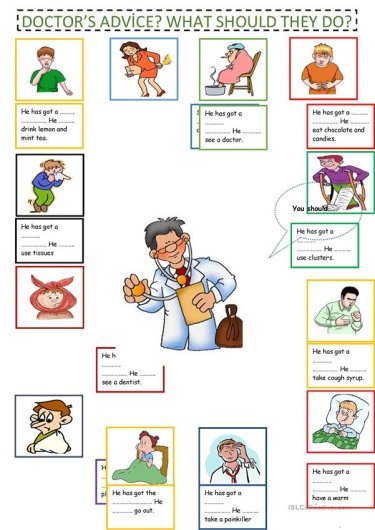
5. Reading
6. Writing
Complete the sentences with must / mustn’t.
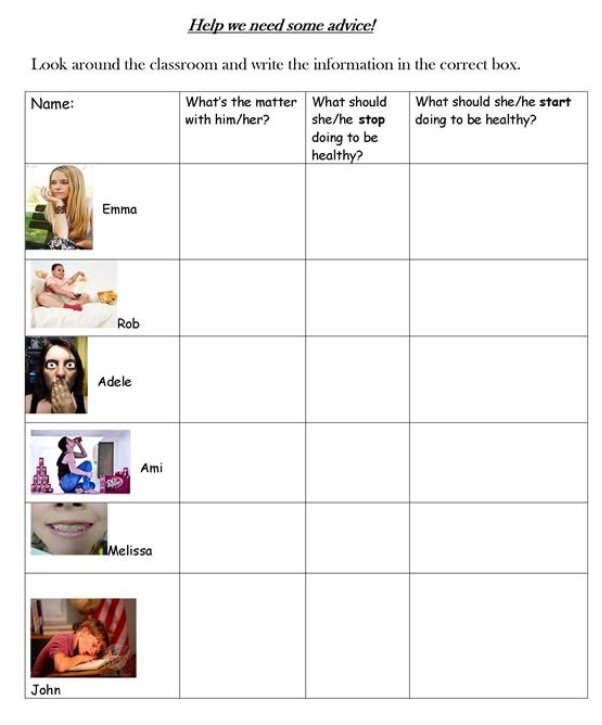
7. Grammar practice
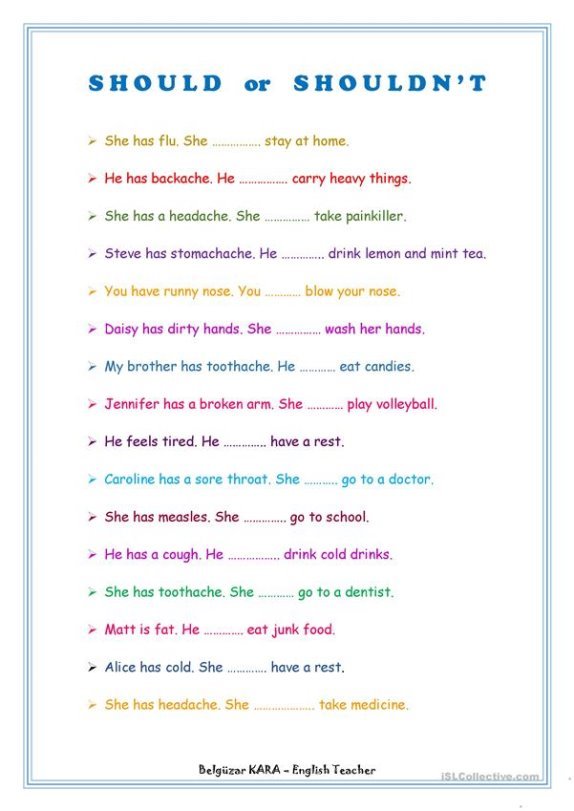
ІІІ. Summarizing
1. Summary
2. Homework
Ex. 5, p. 67.
Lesson 6
Topic: Medical Care
Objects: to practice vocabulary, to develop reading and speaking skills using lexical-grammatical structures, to learn grammar lab: modal verbs – must, should, to develop linguistic guess, to develop positive attitude to the healthy way of life.
Equipments: textbook, workbook, cards, hand-out materials
Type of the lesson: combined.
Procedure
I. Preparing for perception of the foreign language
1. Greeting
2. Aim
T: Today we are going to speak about different kinds of medicines and cases when we use them. You’ll also learn some interesting facts about treatment in the past.
3. Warming up
2) Put the sentences in the correct order to make up a dialogue.
— I’ve got a headache and a sore throat.
— Come in three days.
— You should stay in bed for two or three days, drink a lot of warm tea or milk
with honey.
— Oh, yes. What is it, doctor?
— Thank you, doctor. Goodbye.
— Good morning, doctor. May I come in?
— I think it’s quinsy.
— When should I come to you next time?
— Let’s take your temperature first. Oh, it’s rather high: 38.7 °C. Let’s examine
your throat. Does it hurt to swallow?
— What should I do, doctor?
— Come in, please. What’s wrong with you?
4. Check on homework
Ex. 5, p. 67.
II. Main body
1. Vocabulary practice
People in the medical profession. What do these people do? Match the words and their definitions.
|
1) a surgeon |
a) looks after children and treats their illnesses |
|
2) a sister |
b) is trained to prepare drugs and medicines and works in a shop or in a hospital |
|
3) a dentist |
c) examines and treats people’s eyes |
|
4) a pediatrician |
d) looks after patients in hospital |
|
5) a nurse |
e) looks after your heart |
|
6) a general practitioner / a physician |
f) is a senior nurse in a hospital |
|
7) an oculist |
g) examines and treats people’s ears |
|
8) an ear doctor |
h) does operations in hospital |
|
9) cardiologist |
i) is trained in general medicine and treats people in a particular area or town |
|
10) a pharmacist |
j) looks after your teeth |
Key: 1 h, 2 f, 3 j, 4 a, 5 d, 6 i, 7 c, 8 g, 9 e, 10 b.
T: We spoke about the specialists who work in a hospital. Let’s see if you remember these professions well. «Chain Game»
P1: This doctor deals with children and their illnesses. P2: A paediatrician. This doctor is an eye specialist. P3: An ophthalmologist…
2. Presenting vocabulary. Speaking
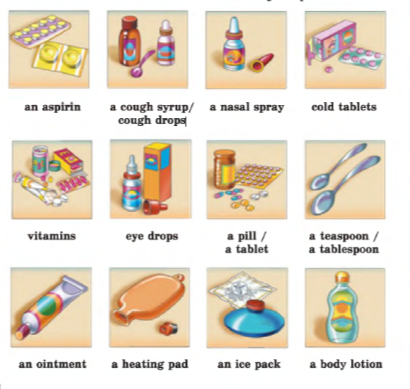
3. Writing
Key: 1 eye drops, 2 an ice pack, 3 pills, 4 nasal spray, 5 ointment, 6 lotion, 7 cough syrup, 8 a tablet of aspirin, 9 vitamins
4. Listening
Listen to the text.
Interviewer: Today I’m talking to Rajan Mehta, a retired doctor. Good afternoon, Rajan.
Rajan: Good afternoon.
Interviewer: Now, you’re originally from Mumbai and you came to work as a doctor in the UK. When was this?
Rajan: In the early sixties, 1962 to be exact.
Interviewer: And why did you come to the UK?
Rajan: Well, it was quite common in those days. Experience of working in the British National Health Service was highly valued in India. I had just finished my medical degree, and I thought this would be a good way to get experience. I only intended to stay for five years, while I completed my postgraduate studies.
Interviewer: So why did you stay longer?
Rajan: Two reasons, really. The first is that I thoroughly enjoyed working for the NHS. The clinical training I received was fantastic, and I worked alongside some excellent consultants and learnt a lot. And the second reason is that I met my wife, who was working as a paediatric nurse.
Interviewer: And so you continued working in the NHS until you retired.
Rajan: That’s correct. First as a paediatrician, and then later I retrained as a GP.
Interviewer: You must have seen a lot of changes in the National Health Service. What was it like when you first came here?
Rajan: It was excellent. I think that there was a lot of respect for the medical profession, maybe more than there is now, and patients had a lot of faith in their doctors. There weren’t so many problems with long waiting lists, and new advances in areas such as organ transplants made it an exciting profession to be in.
Interviewer: Yes, it must have been. Did you have any problems when you first started working in Britain?
Rajan: Well, yes. My first placement was in a hospital in the north-east of England and I had real problems understanding what people were saying to me, which came as quite a shock as I thought I had rather good English. Eventually I confessed to a colleague that I sometimes couldn’t understand what my patients were saying. And she admitted that she had the same problem, as she came from a different part of the country.
Interviewer: Yes, some regional accents can be quite difficult to understand. One last question – do you ever regret not returning to India?
Rajan: No, not really. Of course, I missed my family, but my brother also came to England to live, and I returned quite regularly to visit my parents while they were alive. And I married an English woman and had children here, so England soon became home.
Interviewer: Rajan, thank you very much for coming in and talking to me.
Rajan: It’s been a pleasure.
Complete this postcard that Rajan wrote to a friend in India in 1967.
Dear Anoo, I hope you're well. I'm fine and having an excellent time. I've just finished my post-graduate __________ and I can't believe I've been here for ___________ years already. I've decided to stay here because the clinical ______________ here is so good, and the National ___________ Service is so impressive. And there's another reason. I've met a beautiful English woman, she's a paediatric ___________, and she's agreed to marry me! I've got a job as a ___________ in the same hospital, so everything is going well. Of course, I miss you all in Bombay, but I hope to visit you soon, and with my new wife.
All the best, Rajan
5. Test
1. My doctor ________ some medicine for me.
prescribed
persuaded
persisted
2. I'm having ________ sleeping.
hard
trouble
difficulty
3. The doctor told me to ________ the pills three times a day.
take
eat
consume
4. He ________ a few tests. = He performed/did a few tests.
hurried
carried
ran
5. To come ________ with something = To become ill/sick
clean
out
down
6. You can expect to make a ________ ( = complete) recovery.
full
fully
fool-proof
7. A general practitioner can ________ you to a specialist.
bring
refer
report
8. A test to check your blood is called a ________.
blood exam
blood test
blood trial
9. This woman has lost a lot of blood; She might require a ________.
blood test
blood bank
blood transfusion
10. My doctor was able to ________ and treat my disease.
tell
diagnose
say
III. Summarizing
1. Summary
2. Homework
Ex. 5, p. 69.
Topic: Illnesses and Their Treatment
Objects: to practice vocabulary, to develop reading, writing and speaking skills using lexical-grammatical structures, to learn grammar lab: modal verbs – must, should, to develop independent thinking, to develop positive attitude to the healthy way of life.
Equipments: textbook, workbook, cards, hand-out materials
Type of the lesson: combined.
Procedure
I. Preparing for perception of the foreign language
1. Greeting
2. Aim
T: During our lesson today we are going to speak about different kinds of injuries and some ways of their treatment. We are also going to speak about alternative ways of medical treatment.
3. Warming up
Match the phrases with the people who could say them. One specialist is extra.
1) Open your mouth, please. Which tooth is the problem?
2) Can you see this letter?
3) How have you hurt your leg?
4) Which part of your body do you need to take a picture of?
5) Let’s take your temperature.
6) Does it hurt you to swallow?
a) a nurse
b) a paediatrician
c) a surgeon
d) a dentist
e) a psychiatrist
f) an ophthalmologist
g) an X-ray technician
4. Check on homework
Ex. 5, p. 69.
ІІ. Main body
1. Writing
Make up sentences. Start like this.
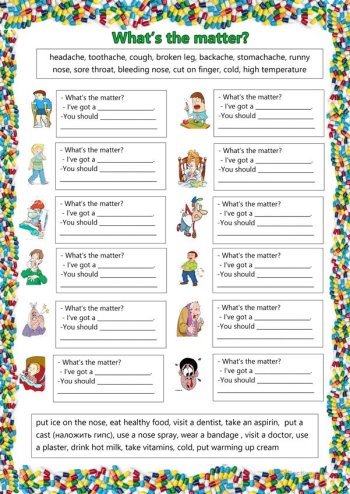
2. Vocabulary practice
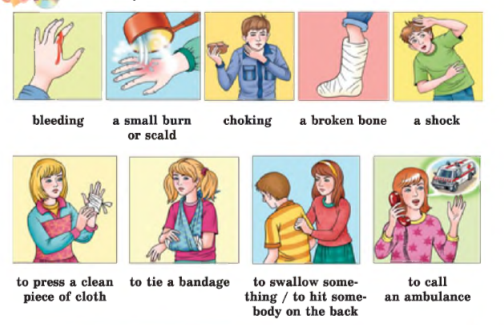
3. Reading
4. Writing
5. Reading
What’s the matter? Match the problem and its solution.
a) give up smoking
b) have it Xrayed
c) place under cold water and apply bandage
d) consult a surgeon
e) use some gargle
f) take some aspirin
g) stay in bed for a while
h) take some medicine
i) go to the dentist
j) lie in the sun for a day or two
k) use nasal drops
l) use some antiseptic
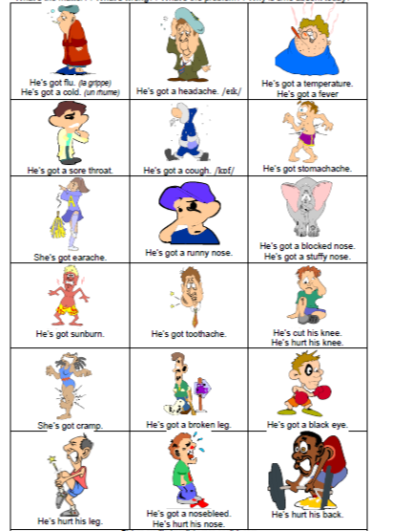
6. Speaking
Work in pairs
Practise with your partner calling the first aid. Make up a dialogue.
7. Reading
ІІІ. Summarizing
1. Summary
2. Homework
Ex. 6, p. 72.
Lesson 8
Topic: Writing an Informal Letter
Objects: to practice vocabulary, to develop writing skills using lexical-grammatical structures, to learn how to write an informal letter, to learn students to express their thoughts logically and consistently, to develop communicative abilities, to develop independent thinking, to develop positive attitude to the healthy way of life, to develop pupils’ ability to care about their friends and relatives.
Equipments: textbook, workbook, cards, hand-out materials
Type of the lesson: combined.
Procedure
I. Preparing for perception of the foreign language
1. Greeting
2. Aim
T: Today we are going to speak about situations when your friends have to stay in
hospital. We are going to discuss ways to cheer them up. Also we will learn how to write an informal letter.
3. Warming up
«Guess the Word»
It happens when you cut a part of your body. (bleeding)
It is caused by a hot liquid. (scald)
It happens when you swallow a large piece of food. (choking)
It may be the result of some accident and makes people ill. (shock)
The help you can give to the injured people before the ambulance arrives. (first aid)
You put it onto the injured part of the body. (bandage)
The medicine for the nose. (nasal spray)
It may be the result of spoiled food. (stomachache)
A person who eats a lot of sweets often has it. (toothache)
You visit this establishment when you are seriously ill. (hospital)
4. Check on homework.
Ex. 6, p. 72.
II. Main body
1. Speaking
1. Rob needs help because he has hurt his arm.
2. Stephan needs help because he has got a temperature.
3. Denis needs help because he has got a toothache.
4. Jill needs help because she has got a problem with eyesight.
2. Vocabulary practice
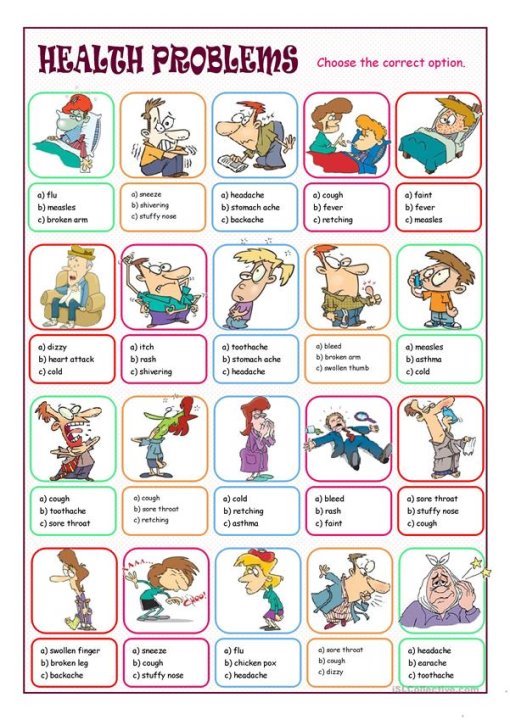
3. Writing and speaking
4. Reading
5. Speaking
6. Writing
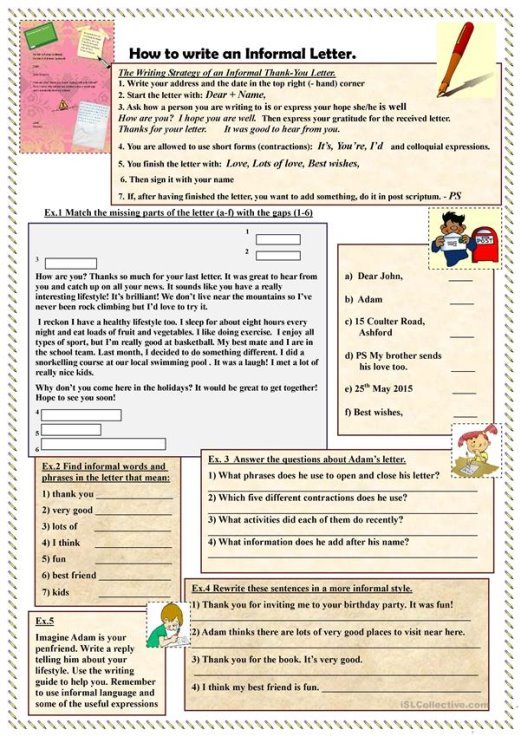
III. Summarizing
1. Summary
T: Today we spoke about ways to cheer up your friend in hospital. Have you ever cheered up your friends in hospital? How did you do it? Have your friends cheered you up in hospital? How did they do it? What did you feel? Were you pleased about it?
2. Homework
Ex. 6, p. 74
Lesson 9
Topic: Health Highlights
Objects: to develop reading, listening and speaking skills using lexical-grammatical structures, to systematize vocabulary, to develop independent thinking, to develop positive attitude to the healthy way of life.
Equipments: textbook, workbook, cards, hand-out materials
Type of the lesson: combined.
Procedure
I. Preparing for perception of the foreign language
1. Greeting
2. Aim
T: Today we are going to speak about the illnesses and their treatment. You’ll also practise your reading, speaking and writing skills. At the end of our lesson you’ll do a self-assessment to check the level of your skills.
Т: Explain the meaning of the words and guess them.
Fever, temperature, pneumonia, allergy…
4. Check on homework
Ex. 6, p. 74.
ІІ. Main body
1. Listening
Listen to the dialogue and complete the sentences.
Carla: So, how are things going, Steve?
Steve: Well, to be honest Carla, I was feeling great on Saturday, but I started to feel sick Sunday afternoon. I thought I'd get better, but I feel worse than before. And I'm really worried because I'm scheduled to give a presentation at work on Friday, so I have to be better by then.
Carla: Well, what seems to be the problem?
Steve: Well, I thought I had the flu, but the doctor said it was just a bad cold. He gave me some cold medicine to take care of my stuffy nose and fever. I'm supposed to take the medicine three times a day after eating, but it doesn't seem to help. He also told me to stay off my feet for a day or so, but I'm so busy these days.
Carla: Listen, forget about that medicine! I have just the thing to get rid of bad colds. You see, my mom is really into herbal medicine.
Steve: Oh, no thanks.
Carla: Ah, come on! Give it a try. You just take some of my mom's herbal tea and drink it four times a day. Believe me. You'll be up and dancing around in no time.
Steve: Dancing around in no time, right? Well, I guess. Nothing else seems to be doing the job.
Carla: Great. I'll come by your place at 7:30. See you then.
2. Speaking
3. Grammar practice
4. Reading and speaking
5. Speaking
Discuss the following statements with your partner and support your ideas.
1) Modern medical technology are developing too rapidly.
2) Modern medical technology improve our life.
3) Modern medical technology often do harm to people.
4) Modern medical technologies can make unreal things real.
IІІ. Summarising
1. Summary
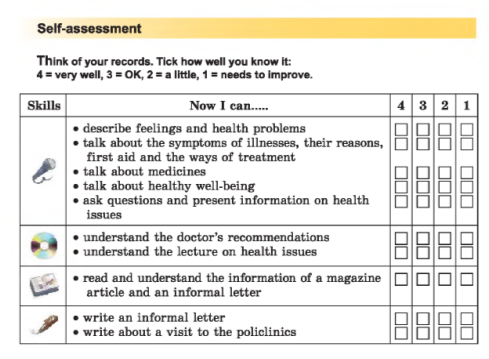
T: What marks did you give yourself for your speaking/listening/reading/writing skills? Which kind of activity is especially difficult for you? What skills would you like to improve?
2. Homework
Ex. 6, p. 76
-
Дякую за змістовний матеріал. Багато корисної інформації та матеріалів містить цикл уроків. Автор працював наполегливо та цілеспрямовано. Буду використовувати деякі на своїх уроках.


про публікацію авторської розробки
Додати розробку
